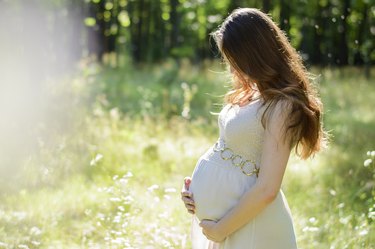
The notion of eating for two has undergone many changes in the recent years as medical researchers have become more aware of how foods affect unborn babies. Different vitamins and minerals are important at different times during pregnancy, changing along with recommended calorie intake. While healthy eating is critical during all stages of pregnancy, the importance of nutrition varies through each trimester.
The First Trimester
Video of the Day
Many people may spend several weeks of their first trimester unaware that they are even pregnant. During this time there is often little weight gain, and few bodies appear pregnant. While it can be tempting to brush off this trimester as less nutritionally important than the other two, there are major developmental changes taking place in both the pregnant person's body and the unborn child's.
Video of the Day
Pregnant people do not need many extra calories this early, but what they do need is plenty of iron and folic acid. Iron is important for preventing anemia as the blood supply increases to support the developing baby. In addition, the American Congress of Obstetricians and Gynecologists reports that pregnant people need at least 400 mg of folic acid daily during their first trimester to prevent neural tube defects.
The Second Trimester
During the second trimester, bodies may start to look pregnant as their unborn babies continue to grow at a rapid pace. The American Pregnancy Association reports that pregnant people in their second trimesters require even more extra calories per day, around 300 more than their usual intake. Protein becomes more important during this time, and other nutrients such as iron and calcium continue to be important for the baby's development.
The Third Trimester
During the third and final trimester of pregnancy, pregnant people continue to gain weight steadily until birth day. They still require around 300 extra calories per day, per the American Pregnancy Association. However, ACOG reports that some may even require a little more than this, as 300 calories per day is an average for the duration of the pregnancy. Protein continues to be very important for the baby's development, as do other nutrients such as the major vitamins, iron, calcium and folic acid.
Which is the Most Important?
The short answer is all of them. However, the real answer isn't quite that simple. During the first trimester, eating well may be inhibited for several reasons. First, you can go for weeks or even months without knowing you are pregnant, meaning you may miss out on key nutrients early in the baby's development. Also, nausea and fatigue are common in early pregnancy, which can make eating well a challenge for the most well-meaning pregnant person.
Fortunately, taking prenatal vitamins can help make up for what is lost in the diet at this stage in pregnancy. However, as pregnancy progresses through the trimesters, food calories become almost as important as the nutrients they contain. While vitamins can compensate for dietary limitations during early pregnancy, eating well during the last two trimesters is crucial for the health of both the pregnant person and baby.